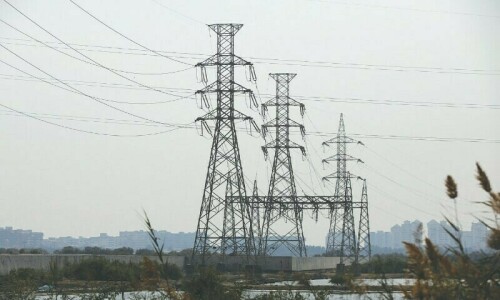ISLAMABAD: The Asian Development Bank (ADB) has expressed dissatisfaction over the pace of award of contracts for foreign-funded projects in Pakistan that leads to project delays, cost overruns and inefficient utilisation of external loans.
This comes at a time when ADB President Takehiko Nakao and IMF Managing Director Christine Lagarde are visiting Islamabad to attend the 15th Ministerial Conference of Central Asia Regional Economic Cooperation beginning from Wednesday.
Representatives from Afghanistan, Azerbaijan, China, Kazakhstan, Kyrgyzstan, Mongolia, Pakistan, Tajikistan, Turkmenistan, Uzbekistan and Georgia will participate in the conference as observers.
The finance ministry said on Sunday that about 200 participants from 10 member countries and multilateral development partners would attend the event.
In its report — annual review of ADB-funded projects as of Dec 31, 2015 — the Manila-based lending agency noted that the time taken to award the first contract after loan approval was more than 13 months on average. “The last five-year average shows that signing of first contract after approval took more than a year,” the bank said, adding that it also included projects where these contracts were signed prior to loan approval, advance contracting and retroactive financing.
Projects in the energy sector and agriculture, natural resource and rural development (ANR) “took relatively longer time to complete their first procurement; average time consumed by the energy and ANR projects is 18.1 months and 16.8 months respectively,” said the report that was not made public.
More than 18 months had passed, but no contract was signed since approval of loans for three projects on Dec 31 last year, it regretted. These included Jamshoro power generation project, National Highway network development project in Balochistan and Fata water resources development project.
“Some of the key reasons for delayed procurement are related to unavailability of design, weak procurement capacities of implementation agencies, litigation, delay in establishment of project management units and project administration challenges,” the report said, adding that as a result the contract awards projection provided in the procurement plan could not be achieved.
This was learnt from the completed projects that during project processing and specifically before approval, the projects need to be scanned through certain readiness filters for efficient project implementation. The project readiness can be measured by looking into the status of four parameters — project design, procurement, safeguards and government approvals.
On the other hand, the ADB said the performance under the multi-financing facility (MFF) portfolio remained mixed last year. Except for the MFF in the ANR sector, more than half of the MFF amount remained uncommitted.
It said there was a substantial underutilisation in transport and energy sectors. However, contract award and disbursement performance for approved tranches in the transport sector was relatively better as compared to the energy sector.
The ADB said that all sovereign loans in Pakistan’s portfolio were approved, signed and reached effectiveness in 6.8 months which compared well with ADB-wide average of 6.9 months.
The bank highlighted some of the challenges on the government side such as lack of ownership by the project staff during processing, lack of understanding of ADB’s procurement guidelines and stipulations of project or loan agreements on procurement which were challenged when found contrary to the government laws and regulations.
The absence of a fully functional internal approval mechanism leading to procurement processes inefficiency, frequent transfer-posting of key project staff and lack of understanding on use of advance contracting were also identified as key problems.
Weaknesses on the ADB side mainly included lack of strong hand-holding of weak executing agencies after conducting procurement capacity and risk assessment and lack of full engagement of all stakeholders during processing leading to a communication gap between the ADB project team and that of the executing agency.
Published in Dawn October 24th, 2016











































